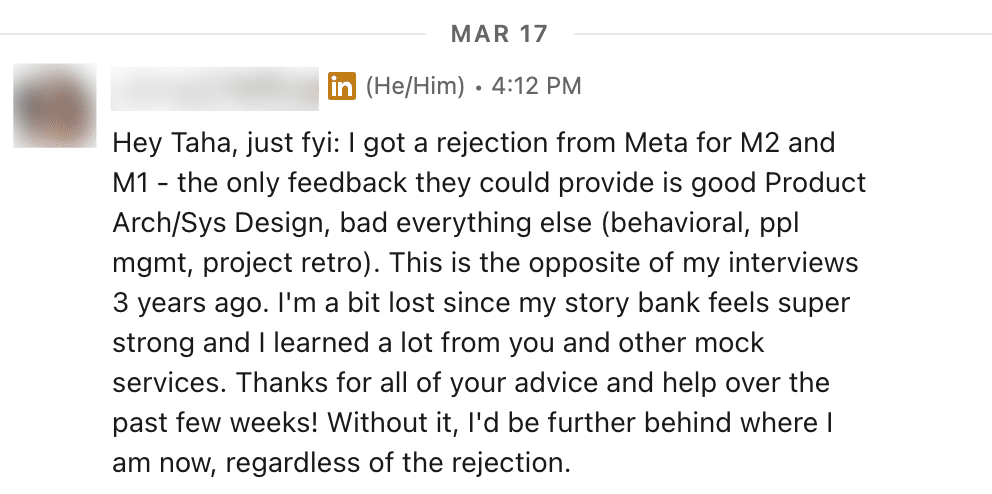The Zoom call started on time. Jeff appeared, fiddling with his headphones.
He had a polite smile. Maybe too polite. The kind you could fold up like a receipt and forget in your jacket pocket.
His Zoom background was honest in a way most aren’t. No blur. No flickering beach. Just the real stuff: an uneven bookshelf, a framed map of a bike trail, and a photo tucked off to the right. He and a kid, maybe twelve, mid-laugh in the stands of a baseball game.
You could almost hear the crack of a bat. Summer, frozen in a frame.
"Thanks for making time," he said.
He was interviewing for an M2 role at Meta. Manager of managers. The kind of job where you don’t just lead, you absorb fire. You inherit scale, velocity, politics, and a salary that makes your friends quietly do the math.
Jeff wasn’t new. Three years leading other leaders. Recently let go from a Director role at a startup. His résumé read like a case study: led, scaled, delivered, transformed.
But under the words, I felt it. That tightness in the air. The tension of a man who played by the rules and still got benched.
“I want to work on my leadership stories,” he said. Like the stories just needed polishing. Like the cracks were cosmetic.
I’ve coached hundreds of leaders. Here’s what no one tells you:
Interviews are mirrors.
And if you’re not ready to see what’s staring back, you’ll spend the whole time adjusting your mask.
Startups reward velocity. Big tech rewards alignment. One teaches you to move fast; the other, to move well.
And somewhere between those worlds, most leaders collect scars that look like promotions. Jeff had a few. Still healing, just beneath the surface.
I already had a guess where the break was. But you can’t just hand someone the truth. You have to give them a flashlight, hang on tight, and walk them to the edge. Slowly.
“Tell me about a time when you saw an engineer who could do better,” I asked. “What did you do?”
He paused. Not long. Just long enough to show he already knew which one.
“When I joined the team, I started meeting with cross-functional partners—product, UX, ops. Everyone warned me about this one engineer.”
He gave a short laugh. No humor in it.
“They didn’t even wait for me to ask. Just… volunteered it.”
“What did they say?”
“That he called people incompetent. Said it directly. Once, in a team meeting, he told someone we should fire them and hire someone smarter.”
His tone was calm. Professional. The voice of a man reading facts from a file he’s already closed.
“I met with his manager. Asked what was being done. Manager was new. Said he was still observing. I told him we didn’t need to observe anymore.”
“And then?”
“I even offered to be in the meeting when he gave feedback. Just in case. He said he didn't need me to.”
That line came soft. Almost too soft.
I took a note.
“It didn’t work,” Jeff said. “So I met with the engineer myself. He doubled down. Said we should just replace a few people. Like he was doing us a favor.”
“Then what?”
“I pulled in HR. Started a PIP. But he quit before it landed.”
He stopped.
The story closed like a cabinet drawer.
“So,” I asked.
“What did you take away from it?”
Jeff exhaled. “He was a brilliant jerk. He didn’t want to change. I took the right steps.”
Wait. Let’s hit pause here.
Hi.
What do you think of Jeff’s story?
If you're nodding, you’re not the first.
Jeff checks every box on the Corporate Savior Checklist:
He protects the team. Names the villain. Slays the villain.
He’s emotionally aware but steady.
He doesn’t micromanage but knows when to step in.
He makes the hard calls early.
He follows the process like a badge-polishing Boy Scout.
Nice.
Neat.
Too neat.
Especially when I smell the buried bones.
I circled back to my note.
“You offered to sit in the room,” I said. “Why?”
His jaw tightened.
“Because I don’t like brilliant jerks.”
Molars grinding. The sentence held back something heavier.
“Have you ever worked with someone like that before?”
Pause. Perhaps a bit too long.
“No,” he said, looking away. “Because I used to be that guy.”
There it was.
The fossil I was looking for.
Not the kind you frame. The kind you drop on your toes. The kind you find again every time you open the wrong closet.
Let’s check one.
“If that engineer had stopped calling people names,” I asked, “if he’d behaved better—would that have solved your problem?”
“Yes.”
“But would it have solved his problem?”
His brow shifted. A small storm gathering.
“What do you mean?”
.png)


![Why Wikipedia Can't Explain Math [video]](https://www.youtube.com/img/desktop/supported_browsers/firefox.png)


